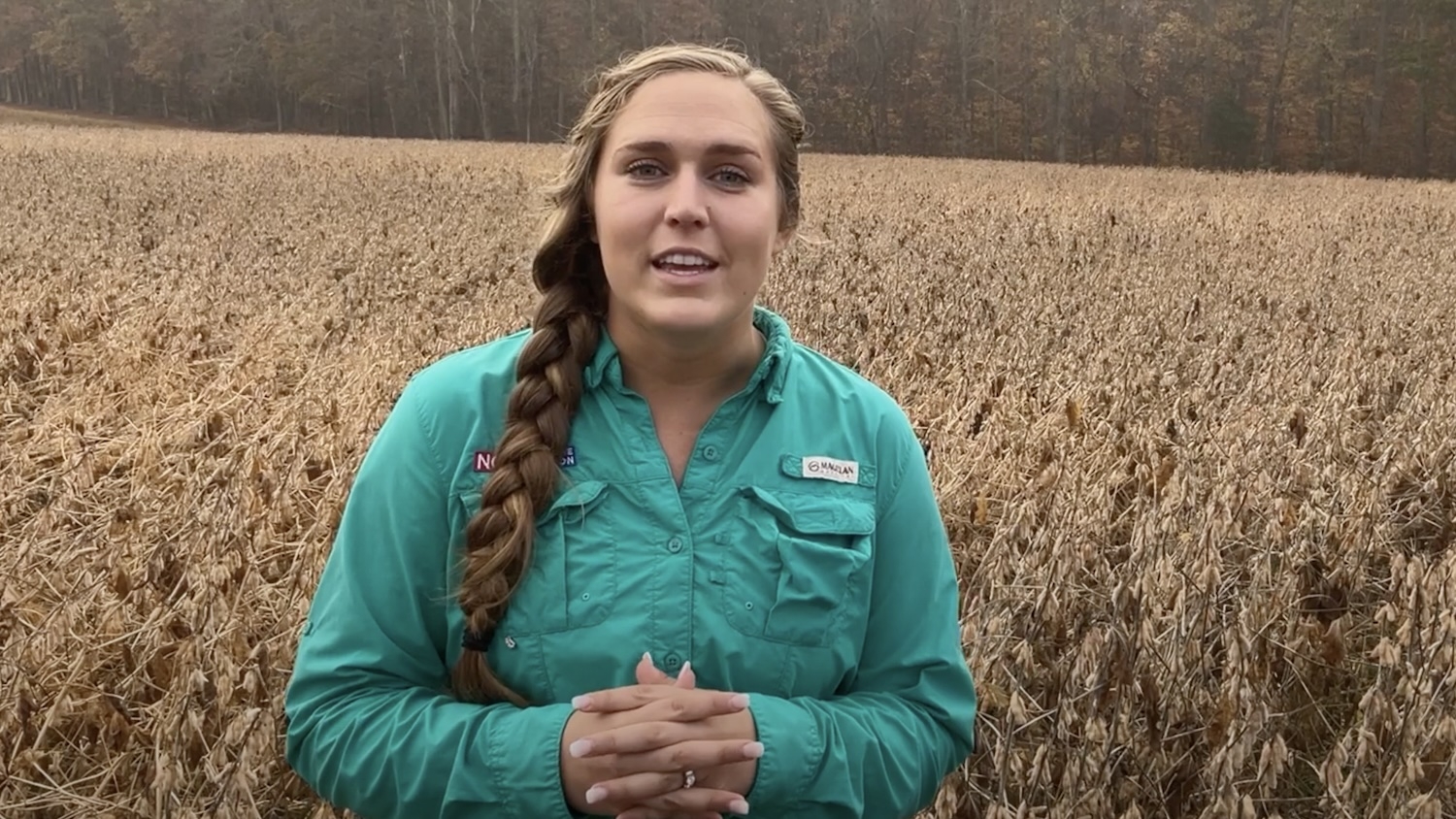Strengthening Connections

The prospect of getting to explain plant science and technology to the farmers for whom it matters most drew Mikayla Berryhill to a career with North Carolina Cooperative Extension.
Over the past year, she’s found her work evolving as she’s played an additional role: getting to bring growers into the N.C. Plant Sciences Initiative’s research and technology development process.
Berryhill, who serves field crops farmers in Person and Granville counties, is among the first 12 agents selected for the initiative’s Extension Agent Network. The network now has 24 members in four cohorts representing North Carolina’s diverse geography and crop production systems.
Rachel Vann leads the network as the N.C. PSI’s platform director for Extension, outreach and engagement. The network was started as a way to leverage the state’s robust Extension system to accelerate technology development.
The idea, Vann says, was to incorporate applied expertise and a high level of connectivity to growers during the technology development pipeline.
“Not only would this help PSI research teams get technology out faster, but it would also help our Extension agents evolve their skillsets and knowledge on cutting-edge innovation from NC State University,” she says.
“It is incredible to see our Extension agents thriving in this role, catalyzing new projects that address their producers’ needs and elevating our Extension system across the university.”
Network Benefits Go Two Ways
Berryhill has seen both researchers and growers benefit from the network. She was part of one of the network’s first projects: helping beta-test a web-based decision support tool with farmers. The tool is designed to help them use information specific to their farm to help them increase yields and efficiency by adopting cover crops.
Based on suggestions that Berryhill passed along from growers who tested the tool, researchers ended up revising the tool significantly to make it more useful.
“It was a cool thing to be able to go out to farmers and show them the software, for them to tell me changes they wanted to see, and then be able to come back a few months later and say, ‘Hey, you remember that change you suggested? It happened.’”
In another case, Berryhill worked with a producer who tested the software and ended up learning more about cover crops than he’d ever known. That grower is now using that knowledge to decide which of those crops might help him with weed control in organic soybeans grown on the same ground.
“That’s just one example of someone I work with who is already using the tool on his farm,” she says. “And working through this technology together with growers has given me a closer connection with my farmers. Extension is all about relationships, and I wouldn’t be able to do my job if I didn’t have good relationships with my farmers.”
From Student to Extension Agent
It was relationships Berryhill was seeking when she joined Extension in 2020. Since high school, she’d thought she would like to follow in the footsteps of Green Revolution hero Norman Borlaug and become a plant breeder.
As a major in crop and soil sciences in the College of Agriculture and Life Sciences at NC State, Berryhill took classes and did internships that exposed her to plant breeding and genomics, and she loved the science and the promise it held for improving people’s lives. However, she realized she wanted more interaction with people than she had working in the lab and field.
That was about the time that a Cooperative Extension agent spoke to one of her classes about his work.
“It sounded like the best job in the world, where I would get to be involved in research and would also be able to explain it to the people it matters most to,” she says.
Berryhill’s first job after her NC State graduation was with Cooperative Extension in Union County. She transferred to Person and Granville counties, then learned about the new N.C. PSI Extension Agent Network last year. She saw it as a way to deepen her service to growers.
“The Plant Sciences Initiative uses interdisciplinary teams to solve plant problems, and I am the person that’s connected to the people that have those problems, the growers,” she says. “Because the network was an opportunity for the agents to be heavily utilized in those teams, I wanted to help create that connection.”
Moving Toward Better Technology
Right now, Berryhill is working on a project team that’s pursuing a grant to develop sensors that could be attached to drones to instantly analyze the nitrogen and phosphorus levels in their soil. The researchers don’t have agricultural backgrounds, and Berryhill sees her role as helping them connect with farmers — the end users — to ensure the technology effectively meets their needs.
Looking ahead, Berryhill sees opportunities with the network to help farmers with precision agriculture.
“I think the Plant Sciences Initiative is going to be integral to NC State staying up-to-date on precision agriculture technologies,” she says. “Everybody is trying to reduce their inputs and be more environmentally sustainable and economically viable, and we need precision agriculture to make that happen.”
Berryhill points specifically to work being done under the N.C. PSI banner to develop a patch that could be put on the leaves of plants to detect when different pathogens are present.
“That’s going to be revolutionary for growers because it will allow them to know when a disease is present and protect their crop beforehand, before they ever see a loss,” she says.
Getting to work on similarly promising N.C. PSI technology is rewarding for Berryhill, fulfilling her long-held desire to help people through agricultural science while satisfying her need for building relationships with people.
“The really big thing for me is being the connection from the researchers to the growers and from the growers back up to the researchers,” she says. “That’s definitely been happening over the years with Extension, but perhaps never as directly as it’s being done with the Plant Sciences Initiative.”
- Categories: